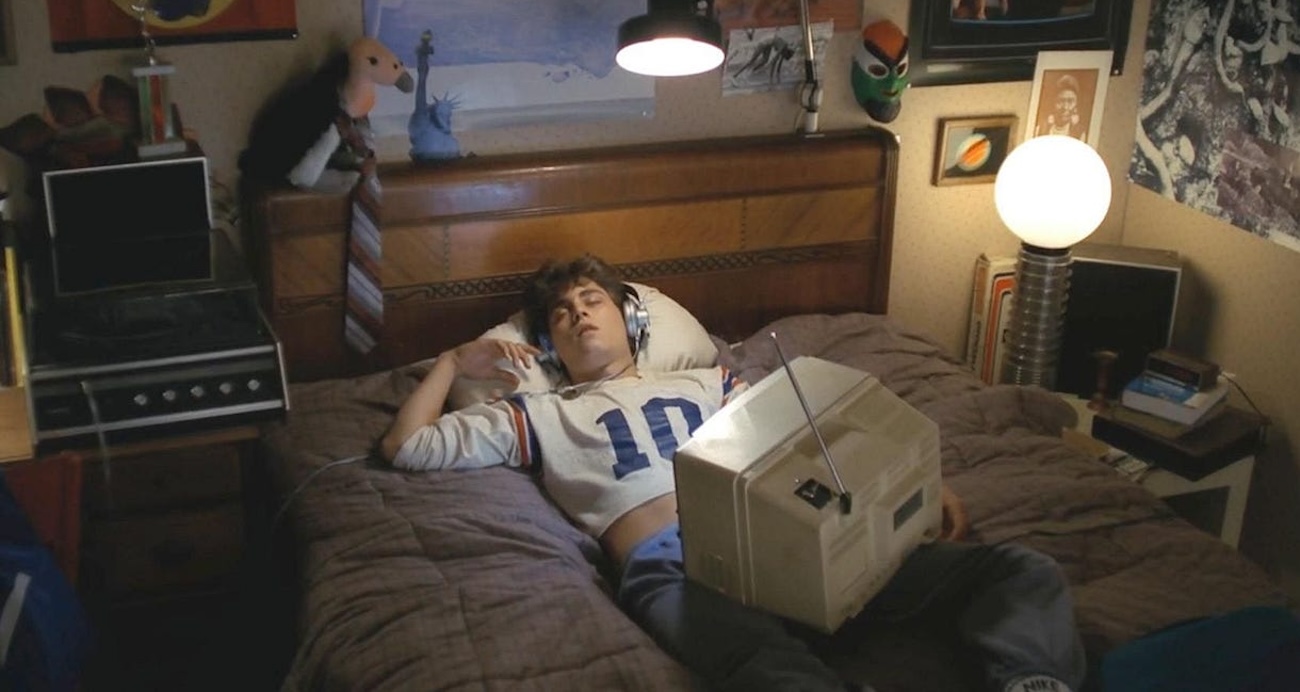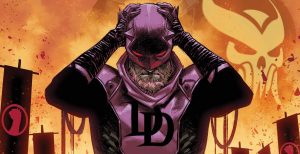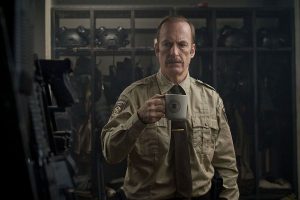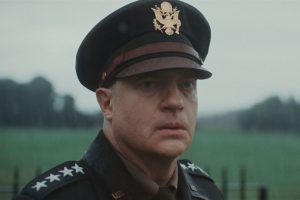
This month’s 40th anniversary of A Nightmare on Elm Street offers all of us a chance to dwell upon the unforgiving passage of time and celebrate one of horror’s greatest franchises. Back in a moment when slashers and their sequels were still trying to prove they could do more than corrupt youths, A Nightmare on Elm Street showed how big such movies could become, and how they could use their popularity as an excuse to explore increasingly elaborate ideas.
… And few aspects of the Freddy Krueger franchise exhibit the evolution of the series better than its kills. While it feels cheap to boil one of the best horror series down to a gimmick which even the crappiest slashers relied on, the Nightmare on Elm Street movies proved that those deaths could be so much more than blood and boobs. By tracking the evolution of those kills, you chart the creative evolution of the series, learn quite a bit about the personalities of its victims, and better understand how Freddy became an unlikely cultural icon.
These aren’t just the best kills in the Nightmare on Elm Street franchise; they’re some of the best kills in horror history.
10. Grady, We Hardly Knew Thee – Nightmare on Elm Street 2: Freddy’s Revenge
Nightmare on Elm Street 2 is a little more respected these days, but the movie is rightfully considered to be the black sheep of the franchise. It’s more of a body horror and haunted house movie that fits awkwardly into the series’ greater timeline (if it fits at all). Yet Nightmare on Elm Street 2’s uniqueness makes it a surprisingly easy rewatch in a series that can start to feel a little samey in its final few installments.
Part of the reason why Grady’s death is so remarkable in the context of this franchise is because it is so unremarkable in many ways. Grady is simply watching over his friend Jesse before Freddy emerges from Jesse’s body and kills him. Aside from the effects sequence of Jesse’s body becoming a vessel for a fired up Freddy (which is incredibly well done in an American Werewolf in London kind of way), the rest of the scene is relatively modest. It’s just a boy screaming for help in a small space where death is slowly stalking him while his parents stand helplessly outside the door. Yet there is a palpable sense of fear from both Grady and his parents in this scene that makes it so much more horrifying than some of the more elaborate kills to come.
9. Taryn’s Bad Trip – Nightmare on Elm Street 3: The Dream Warriors
While the original Nightmare on Elm Street certainly didn’t lack memorable kills (more on those in a bit), Dream Warriors raised the bar for the franchise in that respect. By giving the dreamers more means to defend themselves, Dream Warriors not only offered a way to extend those dream sequences but an excuse to make them more thematically appropriate to the dreamer’s psychology. Taryn’s death toward the end of the film is one of the most powerful examples of the creative benefits of that approach.
After transforming herself into the “deadly and beautiful” punk she sees herself as in her dreams, Taryn confronts Freddy in a very noir-like alley. Following a great fake out involving a man in a trenchcoat, Taryn actually manages to get the upper hand on Freddy during a knife fight. Her victory is short-lived, however, as Freddy turns his blades into syringes and injects a deadly drug into the mouth-like pores of Taryn’s skin. The visuals in this sequence (especially that syringe glove) are among the series’ best, but it’s the more subtle implications of the scene that make it terrifying. In her final moments, Taryn was robbed of the empowerment that came with the dream version of herself and reduced to what the rest of the world saw her as: another wasted junkie.
8. Carlos, Can You Hear Me? – Freddy’s Dead: The Final Nightmare
The nicest thing you can say about The Final Nightmare is that it lost its “worst Nightmare on Elm Street movie” status the moment that the 2010 Nightmare on Elm Street remake was released. The second nicest thing you can say about this movie is that Carlos’ death scene is one of the series’ most disturbing kills.
Like most of the later Nightmare on Elm Street kills, Carlos’ death is based on the character’s greatest fear. In this case, that would be his partial loss of hearing that requires him to wear a hearing aid. You would think that the culmination of Freddy’s exploitation of that fear would be the scene in which Krueger appears as Carlos’ mother and removes Carlos’ eardrum with a massive cotton swab. However, that’s just the start of this hellish sequence in which Freddy tortures Carlos by forcing him to listen to a series of increasingly painful noises through a cursed hearing aid until his head explodes. Is the sight of Freddy orgasmically running his knives over a chalkboard a bit over the top? Perhaps, but there is a relatable effectiveness to the pains in this sequence that keeps it surprisingly grounded.
7. Jennifer Gets Her Big Break – Nightmare on Elm Street 3: The Dream Warriors
Along with raising the quality and quantity of the series’ kills, Nightmare on Elm Street 3 gave Freddy Krueger significantly more dialogue. Specifically, it utilized more of the “quips” that would go on to define the character. Opinions will always be divided over that change in direction, but it’s generally agreed that the third film found the best balance between boogeyman and lounge act. At the very least, it’s generally agreed that Jennifer’s death scene is the most iconic example of said quips being properly weaponized.
Yes, this is the scene in which Freddy utters the strangely immortal line “Welcome to prime time, bitch!” before ramming Jennifer’s head through a TV. The line has been parodied to the point of near-nothingness, but the rest of the scene remains quite effective. The late-night TV setup is one of the better reality-breaking moments in the franchise, and the visual of Freddy’s head and limbs protruding through the suddenly mucus-like texture of the television is some top-notch effects work. There is also something darkly amusing about the idea of someone walking into the room where Jennifer is hanging through an elevated TV set and ruling that death as a suicide.
6. Mrs. Creosote – Nightmare on Elm Street 5: The Dream Child
While the Nightmare on Elm Street franchise has always betrayed the sanctity of sleep, this death scene corrupts another human necessity: eating. While some find it impossible to look at horror scenes involving food and not think about a memorable Monty Python sketch, I’ve always found such scenes to be uniquely disturbing if they are appropriately cruel.
That’s certainly the case with this dream sequence that sees Greta fall asleep at her waspy parent’s dinner party. She wakes up at a nightmare version of that party in which the guests mock her while Freddy feeds her increasingly grotesque items (including her guts) until she chokes. It’s certainly unpleasant, but there is a rich, strangely surreal quality to the sequence’s visuals which lures you in and burns this scene into your brain no matter how much you’d like to forget it. The followup scene in which Allison opens her fridge to slowly rotting stop-motion food and a final jump scare is just the icing on the cake.
5. Debbie Does Dreams – Nightmare on Elm Street 4: The Dream Master
Early into Nightmare on Elm Street 4, the film establishes that Debbie is both a workout nut and scared of bugs. The writers are clearly trying to tell us that one of those personality traits will be factored into her eventual death, but which one will it be? Against considerable odds, the answer is “both.”
Debbie’s death scene begins with the sufficiently horrifying image of her arms being partially ripped off as Freddy spots her while she bench presses. Soon, though, cockroach ligaments painfully sprout from Debbie’s dangling arms in a manner that suggests someone on the crew was a little too into The Fly. Believe it or not, this scene gets really weird a few moments later when Debbie falls to the floor, lands in a vat of gunk, and realizes she has been transported to a roach motel that Freddy squishes just as she completes her full-body transformation. What did poor Debbie ever do?
4. Dan’s Last Ride – Nightmare on Elm Street 5: The Dream Child
For as much flak as Nightmare on Elm Street 5 deservedly catches, the much-maligned sequel is filled with creative imagery that pulls from various genres. There’s quite a bit of German Expressionism throughout the movie, there’s a sequence that effectively recreates A-ha’s Take on Me music video, and in Dan’s death, we find another example of the series’ utilizing Cronenbergian body horror.
Dan’s death begins with one of those incredible Nightmare on Elm Street fakeouts that leads us to believe Freddy will kill him in a car crash. However, Dan is able to seemingly escape that scenario only to find a nearby motorcycle that he procures to get away. We soon learn that the motorcycle has been possessed by Freddy (never trust anything red or green in these movies), who proceeds to meld with Dan until Dan becomes a machine/man/Freddy hybrid who barrels down the highway toward his fiery death. It’s one of those visuals that belongs in a much better movie, but that shouldn’t rob this scene of the respect it deserves.
3. Glen Goes in the Blood Blender – A Nightmare on Elm Street
As the most visually elaborate kill in the original Nightmare on Elm Street, Glen’s death helped set the standard for what was to come. You could argue that even the more conceptually elaborate deaths that followed can’t quite top the sheer spectacle of this one. The scene sees Glen (a young Johnny Depp) be sucked into his bed before a fountain of blood shoots out from his sheeted grave. The trippy nightmare was reportedly achieved with help from an upside-down room and a few hundred gallons of fake blood that quickly became a fire hazard.
For how over-the-top this kill is, though, there is a level of restraint applied to this sequence that really makes it special. The camera hardly moves as we watch Glen and his nearby possessions be sucked into the bed. The incredible soundtrack, and Glen’s slowly fading screams, effectively inform us what unspeakable act is being committed just out of sight, and the payoff is more than we could have hoped for given that the build is so effective in its own right.
2. Phillip Gets Strung Along – Nightmare on Elm Street 3: The Dream Warriors
In a movie filled with death scenes that rank high amongst this franchise’s best kills, Phillip’s murder still feels like the biggest showpiece. It begins with a Freddy-like puppet bringing itself to life via stop-motion animation (a truly incredible effect) before Freddy himself emerges to turn Phillip into a puppet. Not by magic, mind you, but rather by converting Phillip’s skin and ligaments into strings that Freddy uses to guide him through the halls of the hospital. His painful journey culminates with a trip to a balcony where Freddy slowly cuts the strings before Phillip falls to his (at this point, merciful) death.
Few Nightmare deaths can challenge all of the things that this scene does so well. The quality of the effects on display is objectively admirable, but it’s the way they contribute to such a genuinely horrifying death without diminishing its impact that makes them effective. More importantly, this scene doesn’t compromise the heart of the series: the very real fear of being in danger as you sleep. Phillip’s sleepwalking habits are effectively weaponized during this scene, and the fear in the eyes of the other patients when they realize that they are watching him walk to his death would be just as terrifying even if Freddy wasn’t pulling the strings.
1. Tina Sets the Standard – A Nightmare on Elm Street
Some would argue that Tina’s death isn’t elaborate enough to top a list like this, which I would argue against on the basis of that amazing spinning room set finale that ranks high among the most impressive effects in this franchise’s history. Ultimately, though, taking this argument down that path brings us too far from the point.
Tina’s death is one of the most frightening deaths in all of horror. It’s easy to forget, but Tina is initially presented as A Nightmare on Elm Street’s main character. Before she dies, we have every reason to believe she’ll be our final girl (a trick Wes Craven would recreate in Scream’s famous opening). Seeing her die so early on is shocking and watching it happen at the hands of the embodiment of all our boogeyman fears triggers something primal in all of us. This scene betrays whatever sanctuary we previously assigned to things like sleep or even the very concept of watching a horror film. It’s the essence of what makes the original movie so terrifying to this day, and it makes you wonder if this series strayed a bit too far from the things that make it work. Then again, perhaps it was a good idea to go in a different direction rather than try to recreate such a singular and iconic kill.
The post The Best Nightmare on Elm Street Kills Ranked appeared first on Den of Geek.










